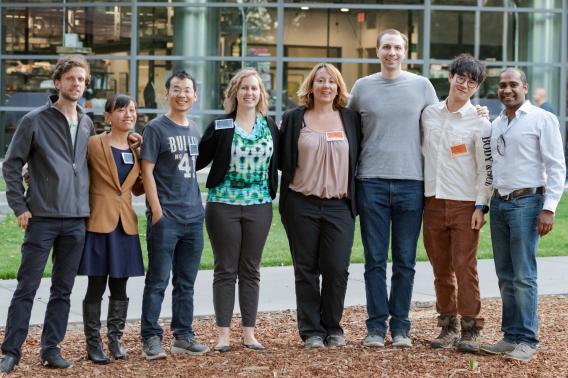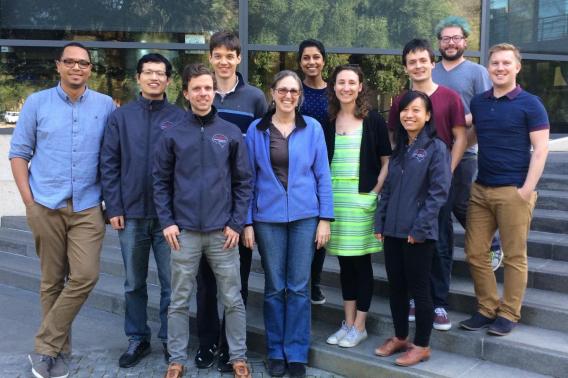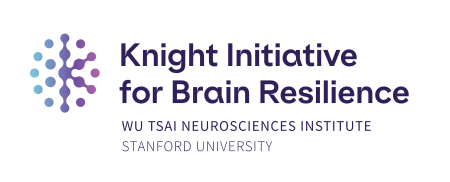Our postdoctoral scholars program provides research support and a community of mentors and peers to extraordinary Stanford postdocs advancing our understanding of the mind and brain in health and disease.
The Wu Tsai Neurosciences Institute's Postdoctoral Scholar Awards support innovative, collaborative and creative postdoctoral researchers from across Stanford who are pursuing novel, multi-disciplinary approaches to understanding the workings of the mind and brain. In addition to receiving research funding, scholars meet regularly for workshops, journal clubs and other activities that allow them to learn from one another’s varied research and personal backgrounds and establish community and collaborations. These Interdisciplinary and Brain Resilience Scholars will advance our knowledge of brain health and aging.
Program Tracks
Interdisciplinary Postdoctoral Scholar Award
Since 2015, the Wu Tsai Neuro's Interdisciplinary Scholars track has supported innovative young researchers with backgrounds in basic and clinical neurosciences, biomedical sciences, physical sciences, social sciences, engineering, education, law, business and humanities who are engaged in cutting edge interdisciplinary research in the neurosciences, broadly defined.
Brain Resilience Postdoctoral Scholar Award
Since 2023, the Brain Resilience Postdoctoral Scholars award of the Knight Initiative for Brain Resilience supports trainees generating paradigm-shifting insights on the mechanisms of neurodegeneration and how to maintain brain resilience into old age.
Application
Deadline to submit your application for the 2025 cohort is Monday, August 26, 2024.
Click here for application and eligibility details.
Program frequently asked questions (FAQs)
Program terms and conditions
Our Model
This program awards two years of fellowship funding and is pleased to provide parental leave. Postdoctoral scholars also receive $5,000 of discretionary research funds annually.
Mentorship
The program provides scientific and career-growth opportunities and guidance under the leadership of program co-directors and faculty mentors Professors Miriam Goodman and Liqun Luo. Scholars meet monthly with their cohort and program faculty mentors to share ideas and discuss approaches to scientific and career challenges, visit each other’s labs to learn about different research techniques and areas of study, and practice communicating their research to scientific and general audiences.
In addition, Brain Resilience Postdoctoral Scholars attend events and seminars hosted by the Knight Initiative for Brain Resilience, and are stewarded by Knight Initiative Associate Director Natasha Hussain and faculty mentor Elizabeth Mormino to learn from one another and build community around the topic of neurodegeneration and brain resilience.
Diversity
The Wu Tsai Neurosciences Institute Postdoctoral program brings together cohorts of postdocs representing the broad range of demographic, experiential and scientific diversity. Women and postdocs from groups underrepresented in the neurosciences are strongly encouraged to apply.
Learn more

Application and Eligibility Details
Carefully review the detailed information below if you are interested in applying to the Interdisciplinary Postdoctoral Scholars track or the Brain Resilience Postdoctoral Scholars track of the program.


Meet current and past scholars
Funded Interdisciplinary Postdoctoral Scholar projects
Funded Brain Resilience Postdoctoral Scholar projects
Sleep and neuronal energy management in neurodegeneration
Neural mechanisms of episodic memory resilience in longitudinal aging brains
Maintaining the health and function of the aging brain is crucial to improving the quality of older people’s lives and reducing societal burden. Aging is often accompanied by a decline in memory for life events (episodic memory), especially in those at risk for Alzheimer’s disease (AD). Yet some at-risk individuals manage to maintain memory function, which raises important questions about the brain mechanisms that underly memory resilience.
Evaluating the immunomodulatory role of circular RNAs in microglia
TREM1 in peripheral myeloid cells exacerbates cognitive decline in aging and Alzheimer's disease
Alzheimer’s disease (AD) is the sixth leading cause of death in the United States and there is a tremendous need for improved therapeutic strategies to treat this prevalent neurodegenerative disease. A devastating symptom of AD is progressive memory loss; this particular disease feature has proven difficult to treat. However, research has begun to unravel novel drivers of AD, including the important role the body’s immune system plays in promoting memory loss.



